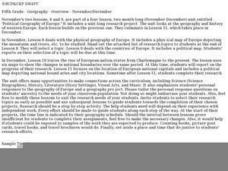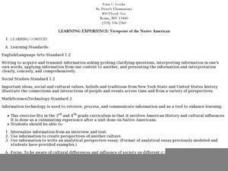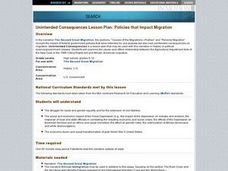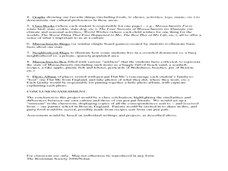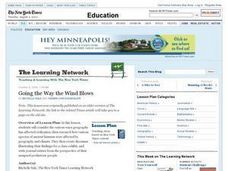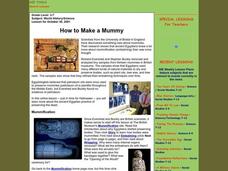Curated OER
Political Geography of Europe
Fifth graders listen to a lecture that traces the political geography of Europe from 814 through 1997. They incorporate these themes into a research project on Western Europe.
Curated OER
Viewpoint of the Native American
Students compare how Native Americans were treated long ago to how they are treated today. They write an essay from the perspective of a Native American from their time period explaining their side with details supporting their views.
Curated OER
Wappo Indians of Napa County
Third graders describe the American Indian nation in their local region long ago and in the recent past in terms of national identities, religious beliefs, customs, and various folklore traditions. They synthesize their findings into a...
Curated OER
Unintended Consequences: Policies that Impact Migration
Students examine the cause-and-effect relationship between the Agricultural Adjustment Acts of the New Deal or the 1965 Voting Rights Act and African-American migration. They write an essay evaluating the effectiveness of the Voting...
Curated OER
Going...going...gone? Tropical Rainforests-How They Work, What They Do for Us, What's Being Done to Them...
Sixth graders explore the Tropical Rainforest and come to understand what it is and how it affects the ecosystem. In this rainforests lesson, 6th graders write about the Tropical Rainforest, imagine they are in the Tropical Rainforest,...
Curated OER
The Search for Mid-East Peace
Twelfth graders demonstrate an understanding of the competing forces and their demands in the Israeli-Palestinian peace process by completing a "Force Field Analysis" (developed by John Rossi at Virginia Commonwealth University) and by...
Curated OER
On the Shoulders of Giants
Students select an astronomer or scientist from the past, research the role that they played in the development of the heliocentric revolution, and make presentations on their achievements.
Curated OER
Chief Sealthe's Speech
Students explain the conflict over land between Native Americans and the United States government. They evaluate Native American values and the results of the U.S. expansion into Native American lands.
Curated OER
1906 San Francisco Earthquake
Students analyze photographs relating to the 1906 San Francisco earthquake for earthquake damage. They determine the cause and effects of the earthquake and the fire.
Curated OER
A Common Thread
Sixth graders explore the Renaissance. In this Renaissance lesson, 6th graders study the culture and society of the middle ages. Students research the geography and climate of the times and discover how these affected agriculture.
Curated OER
Medicine, Technology and Society
Students compare and contrast traditional Chinese and contemporary Western approaches to medicine. They bring a rational and scientific approach to the evaluation of alternative medicines. They study acupuncture from a Chinese and...
Curated OER
Measuring the Earth (Eratoshenes' method)
Sixth graders engage in problem solving, communicating, reasoning, and connecting to represent and solve problems, using geometric models.
Curated OER
Kids Build Pumpkin-Tossing Catapult
Students read a news article about the creation of a catapult that will throw pumpkins. In this current events lesson plan, the teacher introduces the article with a discussion of catapults and a vocabulary activity, then students read...
Curated OER
It's Just a Barn
Investigate Pennsylvania Barns. Have your class consider the elements common to Pennsylvanian barns and why they are significant to the food production process. They write summaries of Frederick Watts and his impact on agriculture.
Curated OER
Out of Old England in the 1630s-Flat Me Project
Learners write letters to penpals. In this geography/literacy lesson, students become penpals with a classroom in England to learn about customs and society across the ocean. Flat Stanley by Will Holton is read aloud, and learners...
Curated OER
Inventions Change the World: The Enigma Machine
Third graders explore WWII by analyzing technological advances. In this invention instructional activity, 3rd graders discuss the use of the Enigma machine which decoded private German messages that communicated with U-boats. Students...
Curated OER
Can You Dig It?
Students use a mock archaeological site to dig up artifacts. They read an article about artifacts found in Syria. They develop a list of artifacts that are related to specific sites in the community. They create an exhibition of these...
PBS
Conceptualizing an Experiment
Students analyze information from a variety of sources in order to create a hypothesis about the origin of an interesting family artifact. They create alternative hypotheses based upon available information in order to understand that...
Curated OER
Going the Way the Wind Blows
Students examine the cause and effect relationship between geography and ancient civilizations. After reading an article, they determine how new findings can help scientists examine the migration patterns of these civilizations. Using...
Curated OER
Natural Resources
Students explore Iowa geography and topographic maps. For this geography and topographic maps lesson, student investigate maps, newspapers, Iowa flora and fauna. Students gain an understanding of how different landforms can be identified...
Curated OER
Tornadoes
Students examine the characteristics of a tornado. They practice using new vocabulary and participate in a question and answer session. They use the internet to gather more specific information.
Curated OER
How To Make a Mummy
Students explore the process of mummification through a British website. They read about why the process began and how it is done. They can follow along in the process in how to make a mummy as well.
Curated OER
Environmental Impact
Students analyze a 20th century photograph of a Los Angeles landscape and examine the population expansion of L.A. They discuss the principles of design, complete a worksheet, and write a research paper on overpopulation in Los Angeles.
Curated OER
The Watershed Quest
Students examine their connection to local watersheds. They describe the water cycle and list species living in their local watershed. They also draw a map of their community.
Other popular searches
- History of Science
- History of Science Museums
- The History of Science
- History of Science Nuclear
- History of Science Physics
- History of Science Georges
- History and Nature of Science
- History and Social Science
- History Social Science
- Ancient Science Inventions
- History and Science Fiction
- History of Forensic Science
